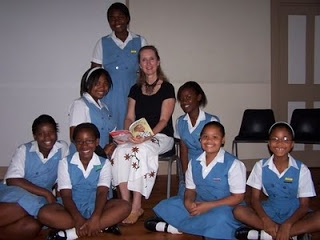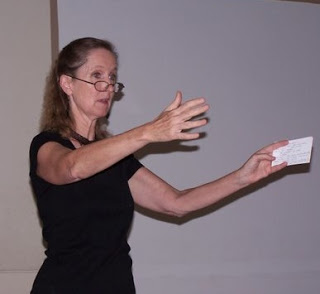 Some of the girls after the assembly Some of the girls after the assembly Six hundred girls in blue cotton pinafore dresses with crisp white blouses looked up at me from the auditorium floor at Kingsridge Senior Primary School in King Williamstown, South Africa. They sat in neat rows from grade four to grade seven, while we talked about the stories they tell and the stories told to them. “Your life is like a story,” I told the girls. “You are the main character—the star of the show!” They smiled and looked pleased. “You are not only the main character,” I went on, relying heavily on Daniel Taylor’s ideas in Tell Me a Story; the Life-shaping Power of Stories. “You are also in some ways the author. You get to decide what happens in your story.” The girls came from a variety of backgrounds. A few white faces were scattered among the black. The London Missionary Society established a church and school in the area in 1826, and King Williamstown was organized a decade later. As an English military fort, the town grew into a major center serving German and English settlers on the frontier between Europeans, pushing east from Cape Province, and the Xhosa peoples of Ciskei. Now out of a population of 20,000 (800,000 in the surrounding communities), there are only a couple thousand whites left. Schools here choose their primary religious affiliation. Other students are free to attend, but on days like today with a Christian missionary speaker, Muslim children were given the opportunity to go to the library instead. Several did, but I saw at least one white headscarf left sitting in the sea of blue uniforms.  “You don’t get to control everything in the story of your life,” I told the girls. “Some things are already decided for you, like who your parents are and where you were born.” An earlier speaker from a program much like the ones where I read books in Johannesburg had just received a contribution of clothing and toys the girls had collected over the past couple weeks. She told the girls about a twelve-year-old from their center who was raped and strangled. (I’m not sure I would have told that particular story, but it is the reality of many.) “Sometimes people may do bad things to you,” I said. “Things you can’t control. Those things aren’t your fault. But you get to decide how you respond to them. Will you be angry and bitter? Or maybe withdraw into yourself and not let anyone come near because you don’t want to be hurt again? Or will you let those things make you a stronger person who draws closer to God as a result? “You are responsible for your choices. You decide if you will be the hero of your story who makes wise choices that lead to a happy ending, or if you will make foolish choices so your life turns into a tragedy of broken relationships and pain. There is no happier ending than living forever with Jesus in heaven. You get to choose how you write this story of your life!” Time was short with two presentations for the same assembly. I cut part of what I had intended to say about being an author. The grade sixes had a scheduled outing and filed out quietly before I read aloud my little book Beads and Braids. I was glad they didn’t have to leave before the challenge to choose their futures wisely. I hope they heard more than a skinny granny, standing on the school stage, talking about stories in a funny American accent.
1 Comment
LeAnne
1/7/2015 06:23:15 am
This post was moved from another site. All comments were lost.
Reply
Leave a Reply. |
AuthorLeAnne Hardy has lived in six countries on four continents. Her books come out of her cross-cultural experiences and her passion to use story to convey spiritual truths in a form that will permeate lives. Add http://www.leannehardy.net/1/feed to your RSS feed.
To receive an e-mail when I post a new blog, please subscribe.
Categories
All
Archives
November 2022
|
 RSS Feed
RSS Feed